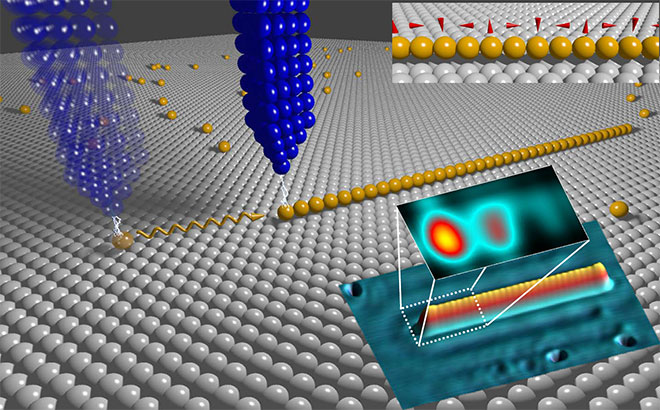Press release
Majoranas in hybrid nanostructures fabricated with atomic-scale precision
Majorana fermions have been predicted about 80 years ago by theoretical physicist Ettore Ma- jorana as particles being their own antiparticles. While the search for such particles is still ongoing at huge particle physics facilities, signatures of the solid-state analogue, the Majorana zero-energy modes, which can emerge in semiconductor-superconductor or magnet-superconductor hybrid systems, have recently been reported by several groups based on clever table-top experiments. This has led to an explosion of research activities in the field because it has been theoretically pre- dicted that such Majorana states exhibit a topological protection which makes them insensitive to quantum-mechanical decoherence effects and therefore qualifies them as robust qubits in future quantum computers. Previous experiments on hybrid nanostructures, however, suffered from the presence of a significant amount of atomic-scale disorder making the clear interpretation of exper- imental results and the comparison with theoretical predictions difficult.
In the May 11th issue of the journal „Science Advances“ a group of physicists from the University of Hamburg headed by Prof. Roland Wiesendanger, in collaboration with theorists from the TU Bu- dapest, reports on the first successful atom-by-atom fabrication of magnetic chains with single- atom width and tunable length on an atomically clean superconducting substrate. They have used a low-temperature scanning tunneling microscope (STM) for the construction of the atomic mag- netic chains with atomic-scale precision, combined with an extensive characterization of the struc- tural, electronic, and magnetic properties of the chains coupled to the superconductor substrate. Most interestingly, they observe the emergence of an enhanced electronic state at zero energy above a critical chain length consistent with the theoretical prediction of a Majorana state. This interpretation is supported by a combined theoretical study for the chosen model system of sin- gle-atom iron chains on superconducting rhenium. While signatures of Majorana states have been reported earlier for other types of hybrid systems, the new platform experimentally realized by the Hamburg group offers many advantages: On one hand, the position and chemical identity of each atom in the hybrid system is well defined, thereby facilitating the comparison with theory and the corresponding interpretation of the data. On the other hand, the technique of STM-based single-atom manipulation does not only allow for the fabrication of linear chains, but also of more complex artificial atom arrangements, e.g. trijunc- tions and crossbar-networks which are required to demonstrate the manipulation of Majorana states as predicted by theory. The outstanding experimental approach to realize Majorana plat- forms atom-by-atom, as demonstrated now by the Hamburg group, will therefore only be the starting point for even more exciting experiments toward the ultimate goal of topological quan- tum computation.
Illustration of the precise construction of a one-dimensional chain of magnetic Fe atoms (yellow spheres) on a super- conducting Re(0001) surface (grey) using a scanning tunneling microscope (STM) tip (blue). The red arrows above the magnetic chain (upper right image) indicate the spin spiral state as deduced from spin-polarized STM measurements. The STM image of the atomic chain (lower right) is overlaid with the simultaneously measured zero-bias conductance map, revealing the enhanced density of states at zero energy as theoretically predicted for Majorana bound states.
Original publication:
H. Kim, A. Palacio-Morales, T. Posske, L. Rózsa, K. Palotás, L. Szunyogh, M. Thorwart,
R. Wiesendanger,Toward tailoring Majorana bound states in artificially constructed magnetic atom chains on elemental superconductors, Science Advances 4, eaar5251 (2018).
Further Information:
Prof. Dr. Prof. h.c. Dr. h.c. Roland Wiesendanger
Department of Physics
University ofHamburg
Jungiusstr. 11a
20355 Hamburg
Phone: +49-40-42838-5244
E-Mail: wiesendanger@physnet.uni-hamburg.de

